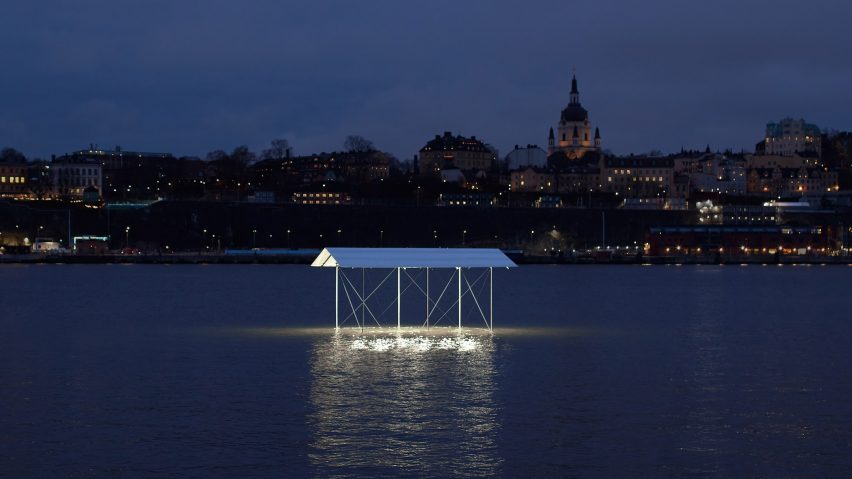Norwegian designer Daniel Rybakken has installed a roof structure in the cold waters surrounding Stockholm, to symbolise the plight of refugees worldwide.
Shelter consists of a simple gable roof raised up on steel columns, with lights installed underneath to cast illumination onto the waters below.
The project pays tribute to Norwegian explorer, scientist and humanitarian Fridtjof Nansen, who was the first high comissioner of what later became the United Nations High Commissioner for Refugees (UNHCR).
"The UNHCR's motto is to put a roof over the heads of people who are fleeing," said Rybakken, who is based in Gothenburg, Sweden.
"I wanted to create a contrast between the shelter of the roof and the coldness of the water, then combine it with this very bright light. It's about creating light in the darkest of times," he told Dezeen.
Shelter was one of various installations created for Nobel Week Lights, a December festival that sees Stockholm filled with light installations that celebrate past laureates of the Nobel Peace Prize.
Nansen was awarded the prize in 1922 after introducing the Nansen Passport, a travel document for refugees that became recognised by 52 national governments.
While other installations were removed after the festival was over, Rybakken's design is remaining in place for at least a year.
It forms part of the programme for Stockholm Design Week, which begins today and continues until 12 February.
Rybakken believes the message is more powerful now the structure stands alone, seemingly marooned off the coast.
"The other light pieces were very visually noisy, but Shelter is much more calm," he said.
The designer hopes those who see it will be reminded of the struggle of refugees at a time when 89.3 million people worldwide are forcibly displaced.
"Some art can be quite difficult to interpret, but I think this is quite literal," he said.
The eight-metre-long roof is made from corrugated aluminium, while the supporting structure is made from steel supplied by project sponsor ArcelorMittal.
It is positioned near Skeppsholmen island, at a point where the water is between one and two metres deep. This made it possible for it to be rooted to the ground, rather than floating.
"It was important for me that this piece wouldn't look like something floating," said Rybakken. "I wanted it to be very stationary, in contrast to the movements around it."
Rybakken is best known for creating lighting designs and installations, including the Daylight Entrance he presented in 2010 or his Ascent lamp for Italian brand Luceplan. The designer said Shelter installation could be described as "my biggest lamp to date".
"The placement makes it visible from all around Stockholm," he added.
During Stockholm Design Week, Rybakken is also unveiling a circular bench he has created with Norwegian street-furniture brand Vestre.

